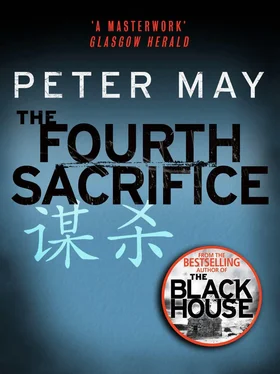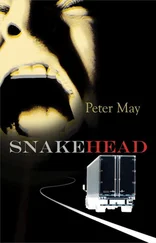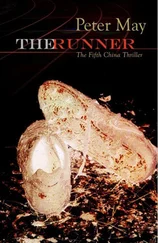Peter May - The Fourth Sacrifice
Здесь есть возможность читать онлайн «Peter May - The Fourth Sacrifice» весь текст электронной книги совершенно бесплатно (целиком полную версию без сокращений). В некоторых случаях можно слушать аудио, скачать через торрент в формате fb2 и присутствует краткое содержание. Год выпуска: 2012, Издательство: Quercus, Жанр: Триллер, на английском языке. Описание произведения, (предисловие) а так же отзывы посетителей доступны на портале библиотеки ЛибКат.
- Название:The Fourth Sacrifice
- Автор:
- Издательство:Quercus
- Жанр:
- Год:2012
- ISBN:нет данных
- Рейтинг книги:4 / 5. Голосов: 1
-
Избранное:Добавить в избранное
- Отзывы:
-
Ваша оценка:
- 80
- 1
- 2
- 3
- 4
- 5
The Fourth Sacrifice: краткое содержание, описание и аннотация
Предлагаем к чтению аннотацию, описание, краткое содержание или предисловие (зависит от того, что написал сам автор книги «The Fourth Sacrifice»). Если вы не нашли необходимую информацию о книге — напишите в комментариях, мы постараемся отыскать её.
The Fourth Sacrifice — читать онлайн бесплатно полную книгу (весь текст) целиком
Ниже представлен текст книги, разбитый по страницам. Система сохранения места последней прочитанной страницы, позволяет с удобством читать онлайн бесплатно книгу «The Fourth Sacrifice», без необходимости каждый раз заново искать на чём Вы остановились. Поставьте закладку, и сможете в любой момент перейти на страницу, на которой закончили чтение.
Интервал:
Закладка:
First they brought steaming bowls of soup filled with noodles and pieces of chicken and mushroom. It was scalding hot and full of flavour. And then came a plate piled with fried dumplings filled with pork and spring onion and beansprouts and coriander. Margaret struggled to handle them with her chopsticks. But they were worth the effort, spicy and delicious dipped in chilli soy.
‘What do you want to drink?’ Michael asked.
She said, ‘Something cold and plenty of it to cool down my mouth. Beer would be good.’
‘Sorry,’ Michael said. ‘No can do. Muslims don’t drink. No alcohol in the Muslim Quarter.’
‘Of course,’ Margaret said. ‘Coke, then.’
Michael spoke to one of the girls who ran across the street to an old woman selling soft drinks off the back of her bike and returned with two plastic bottles.
‘Love the glasses,’ Margaret said, and she took a long pull from the neck of the bottle. But, then, she thought, it was probably more hygienic this way.
The lamb arrived. Great bunches of metal skewers laden with tiny pieces of barbecued lamb, half of them marinaded in a chilli sauce. They were tender and sweet and full of flavour. Margaret watched Michael as he stripped the meat from a skewer and into a dish of soy with his chopsticks, and then delicately picked out the pieces to eat one by one. This was an experience, she thought. Extraordinary, exciting, unlike anything she could have imagined. And yet Michael seemed completely at home, confident and relaxed. She watched how dexterous he was with his chopsticks, and felt the butterflies starting up again in her stomach. She had been attracted to him from the first moment they had met, but now she found herself being drawn inexorably towards him, like a moth to the light.
He caught her eye and smiled. ‘Enjoying it?’
She nodded. She wanted to get closer to him, draw him in, drink from the vast pool of his knowledge, find out everything there was to know about him, his life, his dreams.
‘You were going to tell me about the stuff they found in the coffins at the Ding Ling tomb,’ she said.
He waved a hand dismissively. ‘You don’t want to hear about that.’
‘I do. You said much worse was to happen than the smashing of the coffins.’
Lights shone in Michael’s eyes as he leaned towards her and took her hand. ‘They found the most wonderful things in the coffins, Margaret. Beautiful Ming vases, Buddhist scriptures, dozens of pieces of jade, which the ancient Chinese believed would stop the bodies from decaying. But most extraordinary of all was an array of stunning hand-embroidered quilts and brocades. In the coffin of one of the empresses they found an exquisite jacket embroidered with one hundred boys at play. In the other, they found the body of the empress dressed in a jacket and skirt embroidered with dragons and bats and swastikas. All in perfect condition.’
‘Swastikas?’ Margaret was taken aback. ‘Ancient oriental Nazis?’
Michael smiled. ‘No. Hitler only borrowed it from the Chinese. It was the ancient Chinese character for long life. The cretin even managed to get it the wrong way round.’ He paused, and she saw that intensity in his eyes again. ‘The thing is, all these wonderful embroideries, quilts and jackets and skirts, gold brocades — they had been in there for hundreds of years at a constant temperature, never exposed to the air. No one knew what the effect of oxygen and different humidity levels would be. Hu Bo and the others were still pioneers. They had no idea how to preserve materials like this.’
‘Oh, God,’ Margaret groaned. ‘What happened?’
‘Politics happened,’ Michael said grimly. ‘The great Anti-Rightist Movement of 1958. The leadership ordered work on the tomb to stop. And it ground to a halt for six whole months. The brocades, which the team had tried to preserve by sticking down to plexiglass, hardened and turned brittle. Their colours faded. The wonderful embroideries developed large black spots and began to rot.
‘Hu Bo and his mentor, Xia Nai, had been summoned to Beijing to take part in the political movement. But when they heard what was happening, they hurried back to the tomb. There they found the warehouse, where they had stored the treasures, filled with the smell of mildew. The brilliant colours of the brocades and embroideries had turned into dark clouds. The materials had puckered and shrunk, and when Hu reached out to touch them, they disintegrated in his fingers. Lost for ever. All that remains now are a few sketches made and photographs taken when the coffins were first opened.’
Margaret let out a tiny gasp. ‘It’s unimaginable.’ She shook her head. ‘It must have broken their hearts.’
‘It did,’ Michael said. ‘But there was worse to come.’
‘Jesus,’ Margaret breathed her exasperation. ‘Don’t any of your stories have happy endings?’
Michael shook his head. ‘Not really. After all, are there any really happy endings in life? There may be heart-warming tales en route, but the journey always ends in death, doesn’t it? No one should know that better than you.’
Margaret thought of her poor dead husband, of the murder victims whose photographs she held in her hotel room, of the conveyer belt of corpses that had passed through her autopsy suite. He was right. She herself, Michael, Li, all of them would end up on a cold slab somewhere, sometime. It was a depressing thought. ‘Sure,’ she said. ‘But none of us would ever embark on the journey if we thought too much about where it was going to end.’
Michael smiled. ‘Which is why people invented gods. To give meaning to their lives, and the hope that death was not the end.’
‘So you’re an atheist?’
‘No.’ He shook his head.
‘You believe in God, then?’
‘I don’t know what I believe in. The indomitable spirit of man, perhaps. Of his will to survive, his ability to create, of his propensity to destroy. I believe in history, and that in history we all live on in some small way.’ He chuckled. ‘Anyway, this is all getting a bit serious.’
‘So what was the worse still to come,’ she asked, ‘for poor old Hu Bo?’
Michael smiled and shook his head sadly. ‘Poor old Hu Bo,’ he said. ‘When they were finally allowed to restart work on the tomb, a very important member of the government, and his wife and son, came to visit. It just happened that while they were there, Hu and some others were spraying the place with a mixture of formalin and alcohol to prevent further mildew. The man’s wife started choking and crying, and the boy complained that Hu had tried to poison him.
‘Within a week, Hu was accused of releasing toxic gases, of being the recipient of undeserved privileges. They had also discovered that as a boy he had been in the Youth League of the Kuomintang, Chiang Kai-Shek’s party. Poor old Hu was sent to the countryside for re-education.’
‘Didn’t have much luck, did he?’ Margaret said. ‘And what happened to the tomb?’
‘It was turned into the museum that you see today. Except that what you see today is minus what was destroyed during the Cultural Revolution.’
‘For heaven’s sake, Michael, what next?’ Margaret was incredulous.
‘The museum was stormed by Red Guards,’ Michael said. ‘They dragged the remains of the emperor and his empresses out into the square in front of the stele pavilion and smashed them to pieces, then made a huge pile of everything they could get their hands on and set it on fire. The contents of the tomb represented the Four Olds, you see — everything that the regime was trying to wipe out. We’re filming a re-creation of that scene tomorrow. You should come out and see it.’
‘I’d love to,’ Margaret said, and she realised he was still holding her hand.
Читать дальшеИнтервал:
Закладка:
Похожие книги на «The Fourth Sacrifice»
Представляем Вашему вниманию похожие книги на «The Fourth Sacrifice» списком для выбора. Мы отобрали схожую по названию и смыслу литературу в надежде предоставить читателям больше вариантов отыскать новые, интересные, ещё непрочитанные произведения.
Обсуждение, отзывы о книге «The Fourth Sacrifice» и просто собственные мнения читателей. Оставьте ваши комментарии, напишите, что Вы думаете о произведении, его смысле или главных героях. Укажите что конкретно понравилось, а что нет, и почему Вы так считаете.












